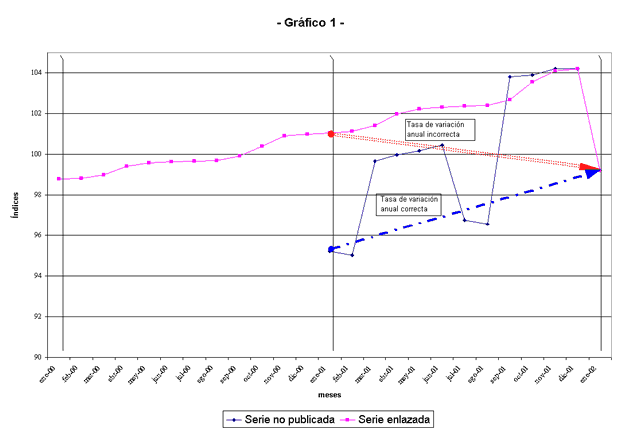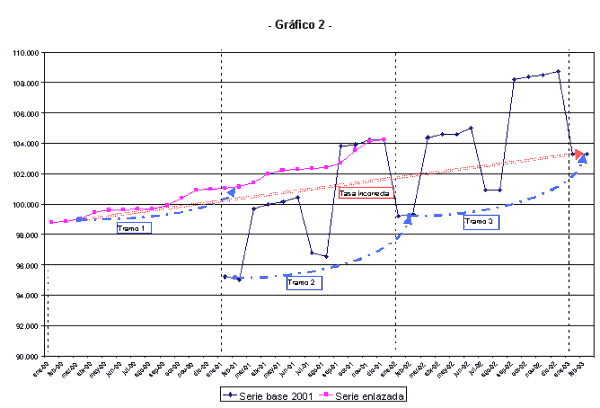
INEbase / Society / Standard, quality and conditions oflife / New system CPI Base 2001
|
Example of the effect of the inclusion of reduced prices in the CPI The supposed practice that appears below shows, in a simple way, the effect on the CPI of the inclusion of sales prices and the solution adopted in this regard. For this, a CPI series has been considered - base 1992 from January 2000 to December 2001 (in table 1, it has been called Published Series - base 92). From 2002 the new CPI system whose base year is 2001 enters into force; this means that during the said year prices have been collected and indices measured according to the new system calculated although they have not been published (in table 1, for the series of these indices they have been called non-published series - base 01, and include the sales prices). Due to the fact that between these two series a base change has occurred, it is necessary to link them to obtain a continuous unique series measured on base 2001. So, the Published Series - base 92 will be transformed into a series in base 2001 by means of a legal link. The legal link consists of calculating a coefficient which relates the indices in both bases in the month of December 2001. Its calculation is carried out as the December 2001 index quotient, in base 2001 (non-published series base 01 (includes sales) and the December 2001 index in base 1992 (Published Series - base 92). In the example this coefficient would be:
Legal link coefficient : 0,814797 The linked indices are obtained as a product of the indices based 92 using the legal link coefficient. Thus, for example:
Linked indice junuary 2000 = 121,26 x 0,81479 = 98,81 The series which appears in table 1 with the name Published Series -base 01 (linked series) contains the base 92 indices transformed with the legal link coefficient up to December 2001 and the indices calculated in the new base from January 2002. Calculation of annual variations rates in 2002 If you act as in previous base changes the calculation of the annual variation rate in January 2002 will be obtained from the following indices:
Index linked January 2001: 101,05
However this rate is not the correct one since the data from January 2002 is incorporated into the sales prices and these also would have to be considered in the January 2001 data. The solution to adopt must have as the main premise comparability between the indices that intervene in the calculation of the rate. The only indices that are fulfilled are those from 2002 (that include sales) and those of 2001 that were calculated but not published. (Non-published series – base 2001) that also include sales. Therefore the correct rate would be the following:
Non-published January 2001 index (includes sales): 95,21
As can be seen if both annual variation rates are compared discrepancies occur even in the sign; as the real variation is positive, in giving a price increase with respect to the previous year as expected. This may be observed in the graph below: 
The INE will facilitate users with the annual variation rates calculated as has been described. Calculation of other variation rates Initial period= year2001Final period >= year 2002 In 2001 indices were published in 2002. In dealing with a base year for the new system indices are also available in base 2001; they are non-published indices that include sales prices. In the same way that was used for the 2002 annual rates it is with these non-published indices with which variation rates between different base periods are calculated. This is the initial period of 2001. The calculation is carried out in the same way as in point 1. In the same way the INE will provide users with the said variation rates. Initial period < year 2001Final period >= year 2002 The reason for which the variation rate may not be obtained from the published indices is the same as that mentioned in point 1. However, the solution adopted is different as there are no indices in base 2001 (that include sales prices) previous to 2001. Therefore, the calculation of the variation rates for those periods whose start is previous to 2001 and end equal or subsequent to 2002 will be carried out by parts. To use the calculation method data will be used from table 1. The calculation of the variation rate between March 2000 and February 2003 will be carried out as explained below. Three temporary sections are considered for those that will obtain the CPI variation rates:
section 1: March 2000 - February 2001 The variation of prices for the first and third section will be calculated from the published indices while for the second section the variation published by the INE will be taken, obtained in the way described separately (this is an annual rate). Section 1: The variation for the first section may be obtained from the indices published in base 1992 or from the indices linked in base 2001 coinciding with the variation rates in both cases. Thus: March 2000 index linked in base 2001: 99,00 March 2000 index in base 1992: 121,50 Variation Rate:
Section 2: The calculation of the rate of this section is carried out with non-published indices from the initial period. This rate will be published by the INE. The way to calculate it is the following: Non-published February 2001 index in base 2001: 95,02
Section 3: The variation for the third section is obtained from the indicators published in base 2001. Index February 2002 base 2001: 99,32 Variation Rate:
With the variation rates calculated for the three sections, the variation rate for the complete period is obtained: 
If instead of calculating by sections it was done in the normal way, that is with the linked index from March 2000 in base 2001 and the index from February 2003 in base 2001 the rate would have been: Index March 2000 linked base 2001: 99,00 Variation Rate:
As can be clearly seen in graph 2, this rate is erroneous because it does not correspond with the real evolution of prices in this period.
|



